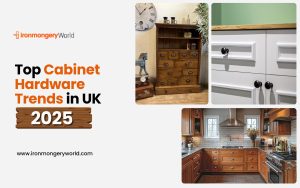Cupboard door catches are essential for organising your kitchen or other cabinetry in your home. These simple yet effective mechanisms keep your cabinet doors securely closed, preventing spills and messes. In this blog, we’ll look at the many types of cabinet door catches, their applications, and some helpful installation advice.
Types of Cupboard Door Catches
There are a variety of cabinet door catches available, each catering to different needs and preferences:
- Magnetic Cupboard Catches: These are among the most common selections for kitchen cabinets. They employ magnets to keep doors closed and are typically simple to install. Their strength varies, so choose a magnetic catch that is appropriate for the weight and size of your cabinet doors.
- Cabinet Door Latches: The latches can be mechanical or magnetic. Mechanical locks take some force to open, but magnetic latches simply pull apart. Both models offer a secure close, making them suitable for homes with children or pets.
- Spring-Loaded Catches: These catches use a spring mechanism to keep the door closed. They are commonly employed in high-traffic areas with frequent door opening and closing.
- Hook and Eye Latches: These latches take a more classic technique, with a hook that fits into a loop or eye. They are typically utilised for larger doors and can provide a rustic aesthetic to your cabinetry.
Read Also: Top Cabinet Hardware Trends in UK for 2025
Uses of Cupboard Door Catches
Cupboard door latches have various roles beyond simply keeping doors closed.
- Safety: Securing cabinet doors in homes with children or pets can help prevent mishaps and keep dangerous goods out of reach.
- Organization: Properly functioning catches contribute to an organised kitchen or storage area by preventing doors from swinging open unexpectedly.
- Aesthetic Appeal: The appropriate kitchen cabinet catches can improve the overall appearance of your cabinetry and compliment your kitchen’s decor.
Installation Tips
Installing cupboard door latches is usually a simple DIY project. Here are some recommendations to help you get through the process:
- Choose the Right Catch: Consider the type of catch that best fits your cabinet doors. If you’re hesitant, search for the best cabinet door locks for home use that strike a compromise between security and convenience of use.
- Measure Accurately: Before you begin installation, determine where you want to position the catch. Alignment is essential for proper functionality.
- Use Proper Tools: A screwdriver, drill, and level will normally be required. Before beginning the installation, double-check that you have everything you need.
- Follow Instructions Carefully: Each form of catch may include special instructions. For example, if you’re studying how to fix a loose cupboard latch lock, be sure you understand the mechanics before getting started.
- Test Functionality: After installation, verify the catch to ensure it holds the door securely. If it doesn’t, you might need to change its location.
Traditional vs. Modern Cupboard Latches
Consider your personal taste while choosing between conventional and modern cupboard latches. Traditional latches often have a rustic appeal, whereas modern latches are sleek and streamlined. Finally, the option is determined by the overall beauty of your kitchen.
Final Words
Finally, cabinet door catches are vital for keeping your home organised and safe. Whether you use magnetic cupboard catches or traditional latches, understanding their different types and installation methods will improve the operation of your cabinetry. I hope you understand the simple DIY installation of cupboard catches, and you can now update your kitchen or storage space with minimal effort. This will ensure your doors stay firmly closed for years to come.



